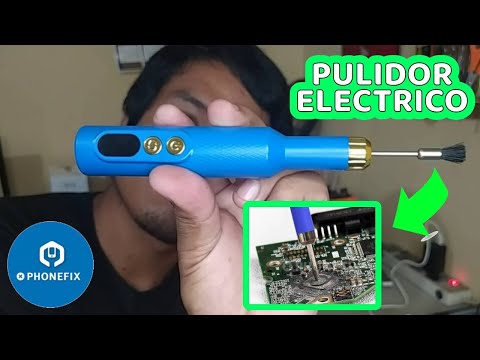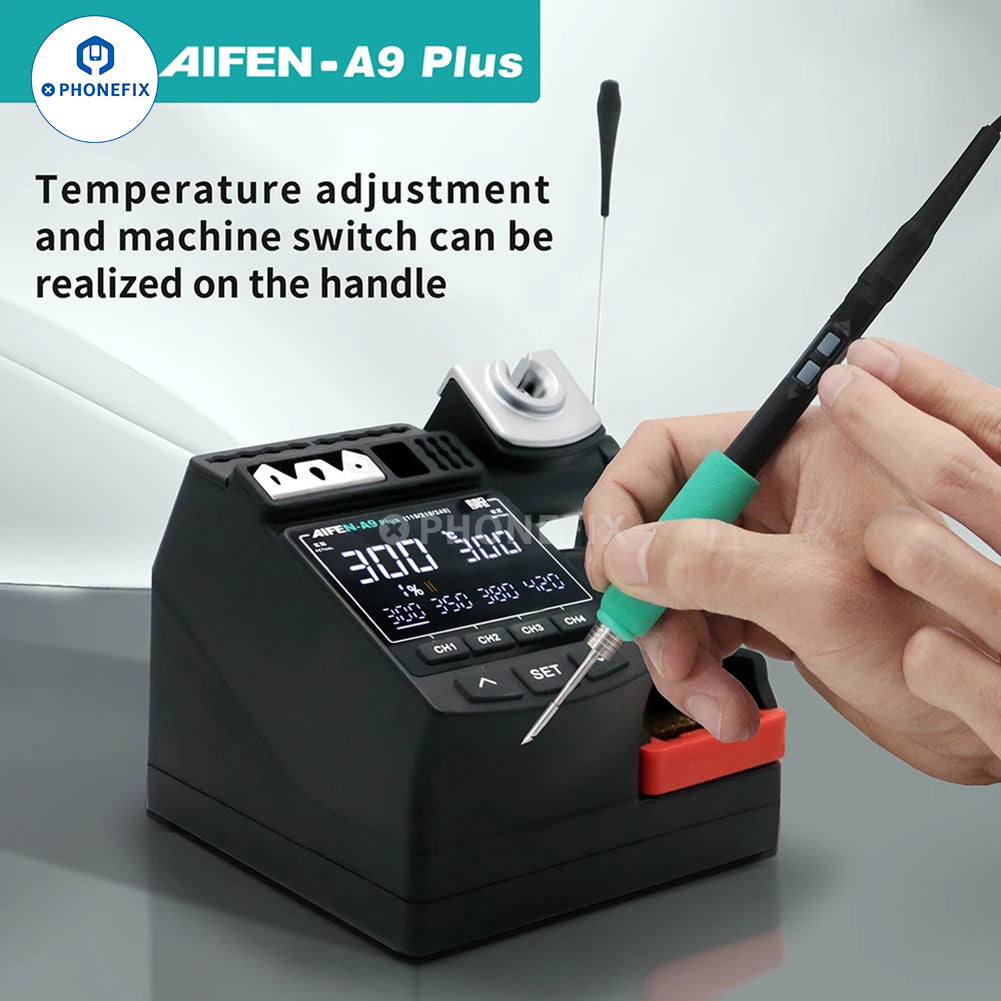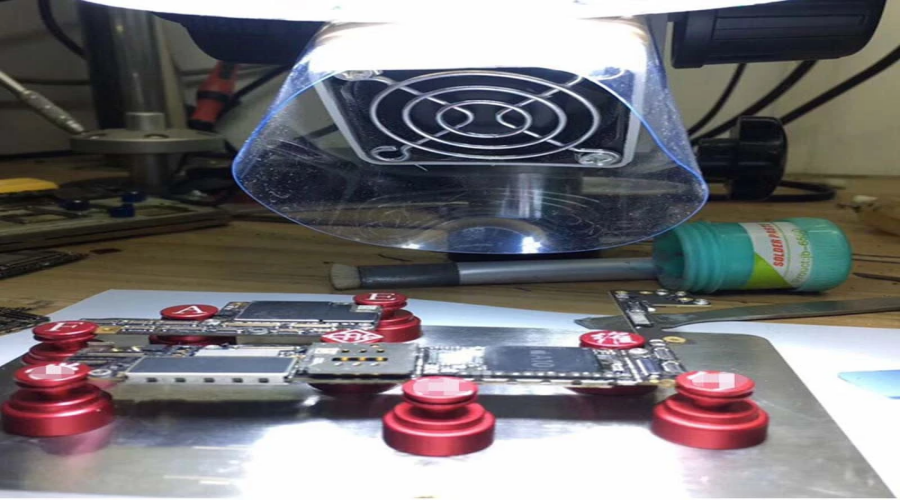Air quality is a critical but often overlooked aspect of phone repair, especially when soldering or working with chemicals that release fumes. Many repair processes, like soldering or adhesive removal, can produce potentially harmful fumes and particulate matter. Technicians who work in phone repair regularly are exposed to these substances and need effective solutions to manage air quality. Two primary options exist: smoke extractors and fans. But which one is truly effective for safe phone repair? This article will compare the two and help you make an informed choice.
2. What Is a Smoke Extractor?
A smoke extractor is a device specifically designed to capture and filter out smoke, fumes, and fine particles at their source. These devices typically feature a powerful suction mechanism and a multi-layer filtration system (such as HEPA or activated carbon filters) that trap airborne contaminants, protecting technicians from inhaling them. Smoke extractors are especially useful in small workspaces or environments with limited ventilation, as they actively remove pollutants from the air rather than simply dispersing them. Some models offer adjustable airflow and replaceable filters, making them versatile and practical for various repair tasks.
3. What Is a Fan, and How Does It Work in Repair Settings?
In phone repair, a fan is sometimes used to manage air quality by dispersing fumes away from the workspace. Fans work by circulating air, helping to reduce the concentration of smoke or odors near the technician. However, unlike smoke extractors, fans do not actually remove contaminants from the air; they merely move them around. This means that while fans might provide some relief in a large, well-ventilated area, they may not be suitable for capturing harmful particles or protecting technicians from exposure in smaller or enclosed spaces. Fans also lack filtration, so their effectiveness in improving air quality is limited.
4. Comparison of Smoke Extractor vs. Fan
Health and Safety
Smoke extractors are purpose-built to improve health and safety by actively capturing and filtering out harmful fumes. Fans, by contrast, only disperse air, which means that toxic particles remain in the environment and could still be inhaled by the technician or others nearby.
Air Filtration Capabilities
The filtration system in smoke extractors is a key feature that fans lack. Most smoke extractors are equipped with multi-stage filters that remove microscopic particles and gases, ensuring a cleaner workspace. Fans do not filter air at all, so they are unable to remove hazardous materials from the environment.
Effectiveness for Small Spaces
In small, enclosed workspaces, smoke extractors are far more effective because they trap pollutants instead of simply circulating them. Fans, on the other hand, may create a misleading sense of airflow in confined areas without reducing the concentration of harmful particles, making them a less suitable choice for such environments.
Noise Levels
Noise is an important consideration for a comfortable work environment. Smoke extractors, particularly those with a quiet or adjustable airflow setting, tend to be quieter than high-powered fans. Fans may require high speeds to circulate air effectively, which can result in louder operation and a more distracting workspace.
Cost and Maintenance
Smoke extractors tend to be more expensive upfront due to their specialized filtration systems and high-performance motors. However, the long-term health benefits and the reduced need for additional ventilation measures may make them a worthwhile investment. Maintenance includes replacing filters regularly, depending on the usage frequency. Fans, in comparison, are generally lower-cost with minimal maintenance, but they don’t offer the same level of protection or filtration.
5. When Should You Choose a Smoke Extractor?
If you frequently work on repairs that involve soldering or other processes that generate fumes, a smoke extractor is a safer and more effective choice. In professional repair shops or situations where technicians work in confined spaces, smoke extractors are essential to maintain a healthier environment. Additionally, if you prioritize safety and health in your workspace, investing in a smoke extractor will significantly reduce your exposure to hazardous fumes.
6: Making the Right Choice for Safe Phone Repair
While both fans and smoke extractors have roles to play in managing air quality, they serve different functions. For professionals and those working frequently with solder or adhesives, a smoke extractor is the safer, more effective option due to its filtration capabilities and ability to remove pollutants from the air. Fans may provide some airflow in larger, open spaces but lack the filtration required for proper air quality management in phone repair. Ultimately, investing in a smoke extractor ensures a healthier workspace, particularly for those looking to prioritize safety and long-term well-being.
Smoke Extractor vs. Fan: Which One Should You Use for Safe Phone Repair?
Diyfixtool Ci
Popular posts
-
 How to Slove with Charging Paused Battery Temperature too Low?Battery TemperatureSep 16, 2024
How to Slove with Charging Paused Battery Temperature too Low?Battery TemperatureSep 16, 2024 -
 How to Resolve iPhone Non-Genuine Battery Pop-up with i2C KC02S?Battery Pop-upMar 06, 2024
How to Resolve iPhone Non-Genuine Battery Pop-up with i2C KC02S?Battery Pop-upMar 06, 2024 -

-
 7 Ways To Fix Charging Stopped Phone Temperature Is Too LowCharging IssueMay 20, 2022
7 Ways To Fix Charging Stopped Phone Temperature Is Too LowCharging IssueMay 20, 2022 -
 Cell Phone Repair Technician's Workstation Setup Ideas & ToolsPhone Repair BusinessDec 23, 2023
Cell Phone Repair Technician's Workstation Setup Ideas & ToolsPhone Repair BusinessDec 23, 2023
PHONEFIX HOT SALE


PHONEFIX
PHONEFIX Polish Grinding Pen PCB Board BGA Chip Removing Repair
Sale priceFrom $0.99 USD
Regular price$2.59 USD
In stock

PHONEFIX
AIFEN A9 Plus Digital Display Soldering Station With T210/245/115 Handle
Sale priceFrom $75.55 USD
Regular price$86.99 USD
In stock

PHONEFIX
188W GaN Charger Phones Laptops PD3.1 Fast Charging Station
Sale price$35.99 USD
Regular price$38.99 USD
In stock





